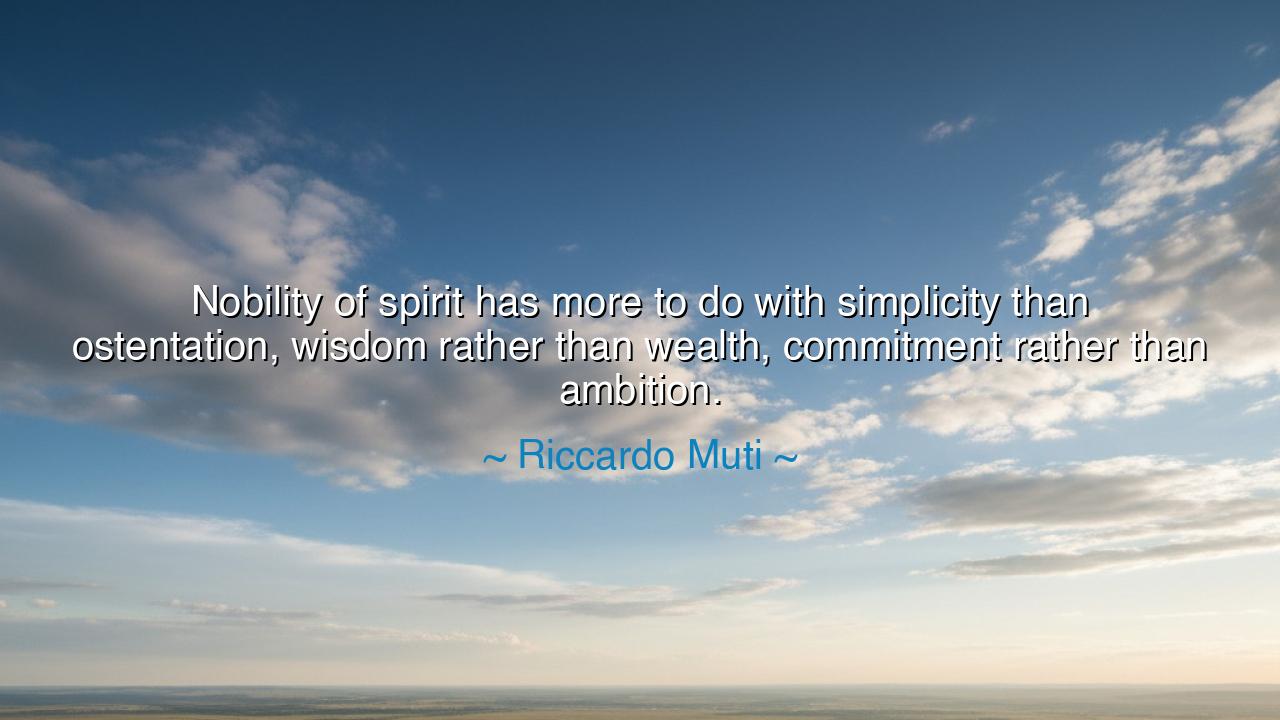
Nobility of spirit has more to do with simplicity than
Nobility of spirit has more to do with simplicity than ostentation, wisdom rather than wealth, commitment rather than ambition.






True nobility is not found in the glitter of crowns or the splendor of riches, but in the quiet radiance of the soul. When Riccardo Muti declared, “Nobility of spirit has more to do with simplicity than ostentation, wisdom rather than wealth, commitment rather than ambition,” he spoke of a truth that has echoed through the ages. Many have mistaken grandeur for greatness, yet outward glory is but a fleeting shadow, while inner virtue endures like an unquenchable flame.
Simplicity is the first mark of true nobility. A spirit that needs no excessive display has already mastered itself. Ostentation, by contrast, seeks to impress the world, yet it is hollow, a fragile mask that crumbles with time. The ancient philosopher Diogenes of Sinope lived in a barrel, owning almost nothing, yet he possessed a strength of character that made even the mighty Alexander the Great respect him. When Alexander asked if he could do anything for him, Diogenes replied, “Yes, step aside, you are blocking my sun.” In that moment, the king and the beggar stood equal, for true nobility lay not in wealth, but in freedom of spirit.
Wisdom is the second pillar of noble character. Wealth may build palaces, but only wisdom can build harmony among people. History tells of rulers who were rich beyond measure yet ruled with cruelty and blindness, leaving their kingdoms in ruin. In contrast, Marcus Aurelius, emperor of Rome, wielded vast power, yet he lived humbly and sought to guide his empire with reason and compassion. His writings in Meditations reveal a soul devoted to truth rather than vanity, proving that wisdom, not wealth, defines the worth of a ruler.
Finally, commitment surpasses ambition. Ambition seeks to climb higher for its own sake, grasping at power and recognition. Commitment, however, binds the heart to a cause greater than the self. Consider Mother Teresa, who turned away from worldly rewards to serve the poor and the sick. Her life was a testament to unwavering devotion, and though she never sought fame, her name became a beacon to millions. Her commitment gave rise to a nobility that no throne or treasure could match.
Let this teaching be passed to all who seek true greatness: adorn not your body with gold, but your soul with virtue. Seek simplicity, for it reveals the strength within. Pursue wisdom, for it lights the path of justice. Hold fast to commitment, for it gives your life meaning beyond personal gain. In these three qualities lies the essence of nobility of spirit, a crown no thief can steal and no time can tarnish, shining eternally in the hearts of the righteous.






1L13-Cam Ly-12A11
I feel both reflective and motivated reading this. It suggests that real greatness is about depth, not display. How often do people mistake ambition for virtue, or wealth for wisdom? I wonder how one can actively nurture simplicity and commitment in a world that rewards complexity, competition, and status. Could embracing these understated qualities enhance personal fulfillment and resilience while fostering authentic respect and admiration from others?
TMTRANDINH MANH
This quote sparks reflection on personal values and leadership. Does it imply that true leaders inspire not through power or wealth but through their consistent commitment, thoughtful decisions, and humble demeanor? I’m curious whether practicing these qualities can positively influence communities and organizations. Could the cultivation of nobility of spirit, as described here, serve as a corrective to contemporary culture’s focus on superficial markers of success?
PDTran Mac Phuc Dinh
I find this statement deeply insightful. It suggests that the qualities often overlooked—simplicity, wisdom, and commitment—are what truly distinguish a person of high character. Could society benefit from redefining success to prioritize these virtues over material wealth or social prestige? I also wonder whether the pursuit of simplicity and wisdom requires conscious effort in a world that constantly celebrates ostentation, or if it can naturally emerge from personal reflection and integrity.
NNaMi
Reading this, I feel both inspired and challenged. It raises the question: if nobility is measured by internal qualities rather than external display, how can we identify it in ourselves and others? I’m curious about the balance between ambition and commitment—can someone pursue goals passionately without losing the essence of a noble spirit? Does this quote suggest that humility and purpose are more admirable than recognition and accolades?
ACAvo Cado
This quote makes me reflect on how society often misjudges true nobility. Is it possible that people equate status, wealth, or flashy achievements with greatness, when in reality, inner qualities like simplicity, wisdom, and dedication define character? I wonder whether cultivating these virtues intentionally could lead to more meaningful relationships and a more grounded life. Could this perspective change how we value ourselves and others beyond material or social accomplishments?